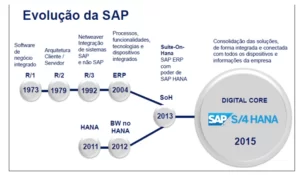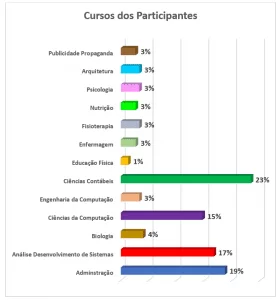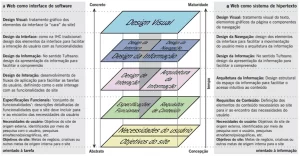ORIGINAL ARTICLE
DENDASCK, Carla Viana [1], DENDASCK, Luiz Miguel [2]
DENDASCK, Carla Viana. DENDASCK, Luiz Miguel. Management awareness through Business Intelligence (BI): change starts with managers and leaders. Revista Científica Multidisciplinar Núcleo do Conhecimento. Year. 07, Ed. 09, Vol. 04, pp. 36-42. September 2022. ISSN: 2448-0959, Access link: https://www.nucleodoconhecimento.com.br/technology-en/management-awareness, DOI: 10.32749/nucleodoconhecimento.com.br/technology-en/management-awareness
ABSTRACT
The complexity of contemporary society, as well as its rapid changes, bring leaders and managers challenges that have never been faced before, and, consequently, the need to adopt tools that can serve as strategies for their respective success. Within this scenario, this article seeks to elucidate: How can changing the leader’s conscience in the adoption of a management model by Business Intelligence (BI) serve as a strategic tool for the organization? Thus, tracing a brief historical and conceptual journey, based on scientific studies, the objective was to bring an explanatory line to serve as a basis for further deepening of this theme.
Keywords: Business Intelligence (BI), Management, Managers and Leaders, Contemporary Manager, Organizations.
INTRODUCTION
The management model and style adopted by both managers and leaders is responsible for directly impacting organizational results. This fact is so real that since the beginning of studies in organizational administration, the theme of leadership styles, management models, organizational results, strategies, decision-making, among others that are similar to this theme are constantly reasons for concern, and , therefore, of investigation in different formats of studies.
The fact is that organizations, regardless of whether they are small, medium or large, depend on having results for their existence and, consequently, growth. However, the question is to understand how to achieve results in an increasingly complex and dynamic market.
Within this context, a new way of seeing data, or even seeing the business as a result of a range of data, treating them as information for decision making, can be presented as a strategic alternative for the contemporary manager.
Although the transformation of data into information for decision-making is not a new concept, quite the contrary, it has occurred since the first evolutionary movements of humanity, since human beings ceased to be nomads, the concept of Business Intelligence (BI) occurred after the technological expansion and the ability to gather data with the aid of systems, which began in the 1970s (ARISTIZÁBAL, 2017). However, it was in the 1950s, more precisely in 1958 that Luhn published a work in the IBM journal, where he pointed out about technologies that were emerging and the possibility of Systems aimed at Business Intelligence (BI).
However, it was only in the 1980s, with the expansion of accessibility to computers, and, consequently, to the systems and architectures that were being created, that the concept of Business Intelligence (BI) began to be discussed, created and adopted, both by the academic world and the corporate world. Bem Gilad, in the 1980s, dedicated himself to investigating Competitive Intelligence and BI, and became one of the great exponents of the theme, recognized until the present day. For Gilad (2003) the basis of a successful business lies in the ability of its managers and leaders to work intelligently to make decisions, which, in turn, must be supported by solid data. Therefore, the adoption of systematic postures must obey methods, making managers and leaders tend to make less mistakes in relation to their decisions, and, consequently, to obtain greater results.
Since Gilad’s work, many others have emerged, and even today, Business Intelligence (BI) continues to be the subject of research. However, most research focuses on systems that propose, after implementation, the provision of dozens of reports and data. It is the data generated that will make it easier for managers and leaders to understand the opportunities and threats, as well as the gaps that may be occurring in their market, both internally and externally, and also promote internal information such as costs, productivity, among others (BARBIERI, 2011).
Sezões, Oliveira and Baptista (2006, p.10), conceptualize Business Intelligence (BI) as:
[…] conceito que engloba um vasto conjunto de aplicações de apoio à tomada de decisão que possibilitam um acesso rápido, partilhado e interactivo das informações, bem com a sua análise e manipulação; através destas ferramentas, os utilizadores podem descobrir relações e tendências e transformar grandes quantidades de informação em conhecimento útil.
However, what we are approaching in this article is precisely the reflection that no super system will work if managers and leaders are not oriented to work within a Consciousness oriented towards Business Intelligence (BI).
BI AS A PRINCIPLE OF CONSCIOUSNESS IN CONTEMPORARY MANAGEMENT
Before continuing to discuss these reflections, it is worth taking a short break to clarify that, in general terms, Business Intelligence (BI), first of all, is the orientation of a business that is based on data for decision making. The literature will associate that these data must be gathered with the aid of systems. These systems are recognized as “Data Warehouse”, which are systems responsible for gathering and processing as much data as possible involving the organizational context.
According to Aristizábal (2016) the main components that involve a Business Intelligence (BI) system should include: 1) Technologies for data acquisition and storage (Data Warehouse and Extraction-transformation-loading (ETL)); 2) Technology for Data Analysis (Online Analytical Processing and Data Mining); 3) User interface (Dashboards and other visualization tools).
Figure 1 exemplifies a basic BI structure:
Figure 1- Main components of Business Intelligence (BI)
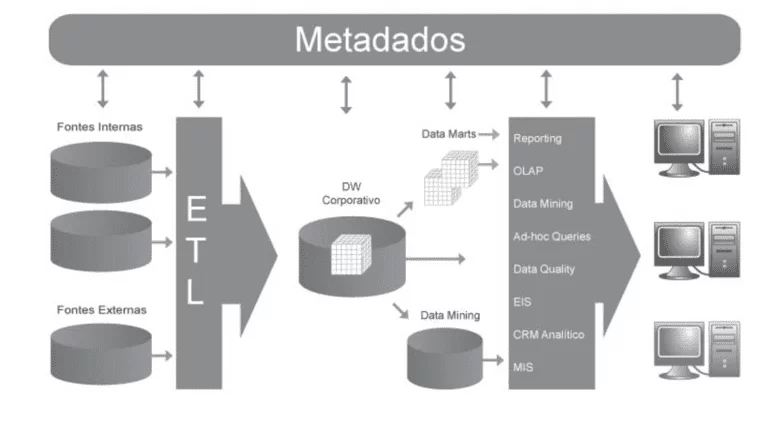
According to Teixeira and Misaghi (2012) for the implementation of Business Intelligence (BI) it is necessary to consider both its architecture and the components that will enable its implementation, considering everyone in the organization, starting with people, database systems , data sources, data integration layers, and finally, data access layer.
Aristizábal (2016) also argues that BI systems support decision-making at all management levels, regardless of sector or organizational size. The study by Ahmed (2017) pointed out that data-based management in the contemporary world extends far beyond a formal organization, but is capable of developing solutions to previously complex problems, such as, for example, adopting measures for diseases, such as treatment at the cancer, because through concrete data, the whole team can decide on the best procedure to be adopted, or even, to administer the issue of organ management.
Gonçalves (2018) investigated the factors that guide success in the implementation of Business Intelligence (BI) in service providers in the Brazilian market, indicating that the quality perceived by managers and leaders is one of the major factors for success to occur. However, there will be no way to perceive quality if the manager is not predisposed to work with a collaborative attitude.
Sezões, Oliveira and Baptista (2006), point out that Business Intelligence (BI) offers advantages for all functional sectors of the company. Figure 2 summarizes the authors’ statements.
Figure 2- Value Added by BI in organizations
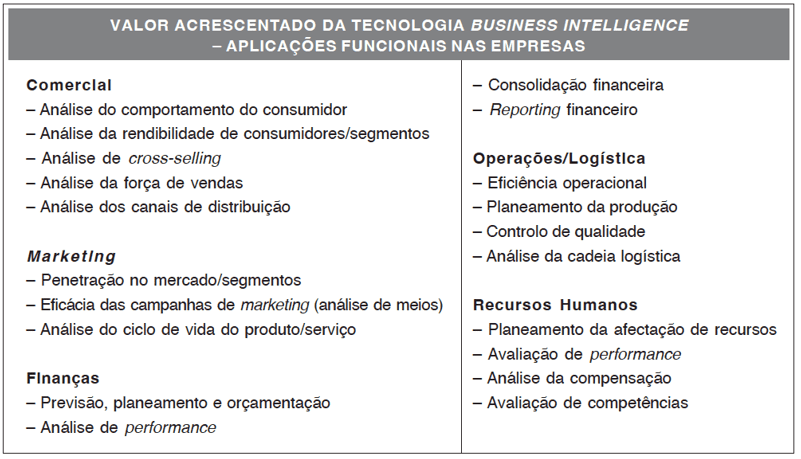
Thus, it is considered that the success of a Business Intelligence (BI)-oriented management will depend on a multidimensional vision, not only on the part of managers and leaders, but also, if not mainly, on the person responsible for implementation. Such implementations can be carried out either by third parties or by managers, leaders or employees themselves. However, the level and format of information gathering and processing will directly depend on the objectives and vision of those responsible (ARISTIZÁBAL, 2016).
Sezões, Oliveira and Baptista (2006) corroborate that the implementation of a Business Intelligence system will be able to provide data that can offer privileged information. However, as in the course of history, it will be up to the human who relates to this information to know how to read this data, and also, to use them more effectively for their business.
FINAL CONSIDERATIONS
This article sought to establish the conceptual and technical principles that involve Business Intelligence (BI), establishing a logical character of its formation that is based on the transformation of data into information that can be used to direct the organization in the best way.
However, if, on the one hand, contemporary society is presented as complex and difficult to manage, on the other hand, technologies have enabled the union of data with offers of both targeted and outsourced systems, capable of supporting decision-making based on a strategic logic.
However, it is recognized that although technology has occurred within a very large advance, and that implementing Business Intelligence (BI) has become increasingly accessible, the challenge of human mentality and consciousness is still one of the factors more impediments to the success of Business Intelligence (BI) in organizations, since machines and systems will always need human aptitude so that they can perform their functions, thus passing through a human filter of acceptance and incorporation of technologies.
REFERENCES
AHMED, S. Y. M. Development of a Data Warehouse to Support the Evaluation of a Cervical Cancer Screening Program. Tese (doutorado) – UFRJ/ COPPE/ Programa de Engenharia Biomédica, 2017.
ARISTIZÁBAL, C.R. Sucesso de Sistemas de Business Intelligence: Uma abordagem multidimensional. Tese (doutorado) apresentada à Universidade de São Paulo, 2016.
BARBIERI, C. Business Intelligence: modelagem e qualidade. Elsevier, Brasil, 2011.
GILAD, B. E. W. Early Warning: Using competitive intelligence to anticipate market shifts, control risks and create powerful strategies. New York: AMACOM, 2003.
GONÇALVES, E.B. Utilização de Sistemas de Inteligência de Negócios em empresas de Serviços. Tese (doutorado) apresentada à Universidade de São Paulo, 2018.
LUHN, H.P. A Business Intelligence System. IBM Journal of Research and Development, 2, 314-319, 1958.
SEZÕES, C; OLIVEIRA, J; BAPTISTA, M. Business Intelligence. Sociedade Portuguesa de Inovação Consultadoria Empresarial e Fomento da Inovação, S.A. Portugal, 2006.
TEIXEIRA, M.R; MISAGHI, M. Business Intelligence aplicado na gestão acadêmica. Conferência IADIS Ibero-Americana, ISBN: 978-989-8533-11-1 © 2012.
[1] PhD in Psychology and Clinical Psychoanalysis. Doctorate in progress in Communication and Semiotics at the Pontifícia Universidade Católica de São Paulo (PUC/SP). Master’s Degree in Religious Sciences from Universidade Presbiteriana Mackenzie. Master in Clinical Psychoanalysis. Degree in Biological Sciences. Degree in Theology. He has been working with Scientific Methodology (Research Method) for more than 15 years in the Scientific Production Guidance of Master’s and Doctoral Students. Specialist in Market Research and Health Research. ORCID: 0000-0003-2952-4337.
[2] Degree in Business Administration, Majoring in Software Engineering and Specialist in Information Security.
Enviado: Setembro, 2022.
Aprovado: Setembro, 2022.

